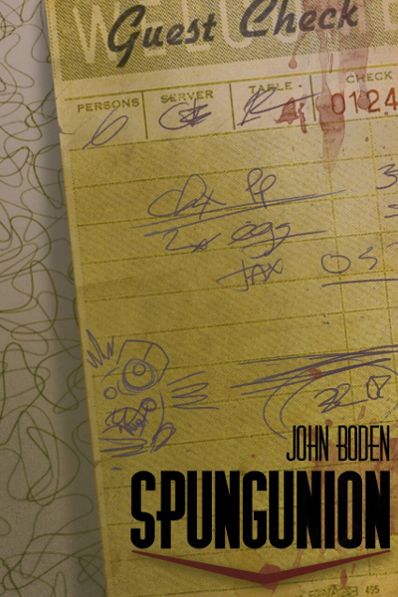Spungunion
John Boden
Dynatox Ministries
31 October 2017
Reviewed by William Grabowski
[Spungunion: (pronounced: Spun-Gun-Yun) noun; 1.) a dish made from rotting road kill, usually a skunk or an opossum. The more fragrant or maggoty, the better. 2.) Something that’s been on the road for a long and unfortunate time.]
With Spungunion, John Boden shows the novella form might be the optimal length for genre storytelling—particularly on the darker end of the spectrum. Echoing Marilyn Manson’s epigraphical “Music is the strongest form of magic,” Boden’s unique sensibilities resonate with the haunting regret, yearning, and occasional happiness of old-time hobo, country, and trucker songs by Boxcar Willie, Red Sovine, Drive-By Truckers, Loretta Lynn, and others listed in the Soundtrack Acknowledgements. I’ll go further: John Boden is doing for Horror/New Weird what Scott McClanahan (Hill William), Daniel Woodrell (Winter’s Bone), and the beyond-brutal lyricism of Donald Ray Pollock (Knockemstiff) did for—and with—so-called Rural Noir.
After his wife’s murder, widower Deke Larch isn’t so much living life in Morning Glory Trailer Park as enduring it, even preserving the bloody bed mattress he and Lucille once shared. With marked ambivalence, Deke nonetheless understands the necessity to keep body and soul together, remaining employed as a trucker. The seemingly infinite highways don’t exactly protect him from flights of self-tormenting thoughts and visions, nor snuff in his heart cold black fire flaring for vengeance.
It’s hard to imagine anyone existing in Deke’s “home,” a space of anonymous desolation as broken and spare as his anguished inner self. Rather than merely tell the reader how Lucille (horribly) died, Boden provides glimpses of her relationship with Deke, which reveal the profundity of his loss, the cosmic absurdity of the idea that someone so sweet and vital could be ended by a killer’s blade. Even without the fantastical elements (and two of the most repulsive “individuals” outside an Edward Lee yarn), Spungunion could stand on its own, but that would deprive us of Boden’s intensely poetic voodoo.
Those who have never experienced the overwhelm of grief, its corrosion of even the idea of hope, will be surprised how Deke ends up. Those who have might clench their teeth and swallow hard.
As Bracken MacLeod notes in his Introduction, “Dark Like Murder Ballads,” Boden “ . . . writes melancholy like nobody I know . . . strips sadness bare and lays it out in a way that’s stark and impacting.” I would agree, and add: this aspect sets Boden apart from many of his contemporaries, who seem unwilling or unable to confront and splinter the illusions that make life bearable for others. It takes another writer to point out that exploring in ourselves (hence reliving) hardship and despair is a necessary risk. No one walks out of the narrative unharmed.
Dedicating Spungunion to his father, Boden reminds us that life’s road can be shorter—and stranger far—than we can know. Our common humanity and love, when we choose to acknowledge them, are all we have. Shields against personal trauma, and the awareness of mortality’s hovering presence.









